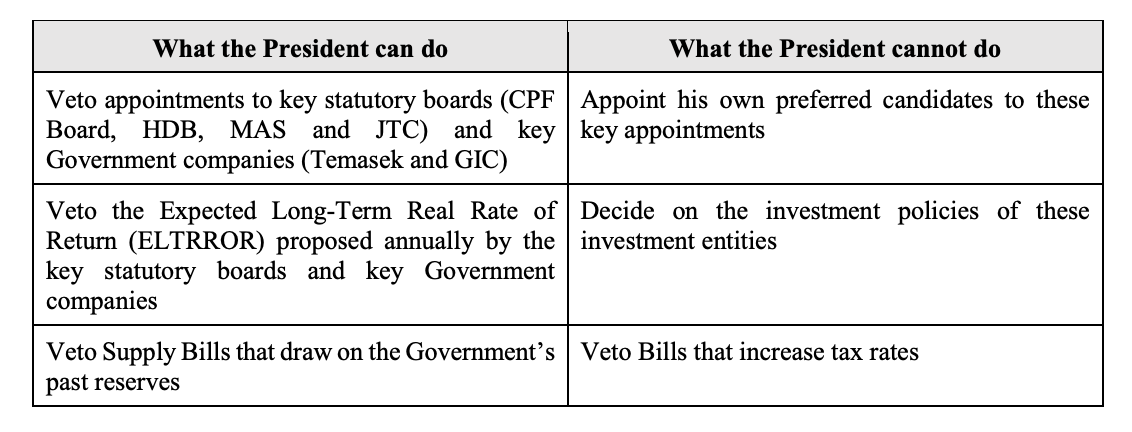"I think the Prime Minister is a very sensible man," remarked presidential candidate Tan Kin Lian, responding to a question about how he would handle potential disagreements over government policies.
"Mr Tharman said that the President has soft power... But Mr Tharman [also said] that the soft power is effective only when there is good relations between the President and the Prime Minister. I want to say I agree," he said.
Tan was on a walkabout at Geylang Serai Market and Food Centre on Aug. 25 when he paused to give a speech and take questions from the media.
His response comes two days after one of his opponents, Tharman Shanmugaratnam, spoke about the importance of having "respect" between the President and Prime Minister.
Tan himself said that if elected, he will seek to have good relations with the Prime Minister.
Finding common ground with PM Lee
Maintaining "good relations" with the Prime Minister would pave the way for both parties to "collaborate" and achieve common goals, Tan elaborated.
He added that these common goals are to bring down the cost of living, provide affordable housing, and ensure secure and well-paying jobs.
"It is very easy for Mr Tharman to have good relations with the Prime Minister because they share the same policies, the same ideas for 20 over years," said Tan.
However, he went on to say that it would be "very difficult" for Tharman to think of different policies as he is "not a chameleon who change colour".
During a press conference on Jul. 26, Tharman had previously mentioned that there was no need for him to "change [his] colours like a chameleon" as he was "same person with the same integrity and the same independence of mind".
"The people of Singapore want some of the policies to be changed, and therefore they [have] a choice to vote for me so that I can convey to the Prime Minister the wishes, the aspirations, and even the hardships of the people," said Tan.
"Not opposition", but a problem solver
Tan also said that he would convey such sentiments to the Prime Minister in the spirit of consultation and collaboration, not confrontation.
"I want to say the relationship between the Prime Minister and the President should be among equals. It is not one superior and the other less superior," Tan opined, also refuting the idea that he is "opposition".
"I am not opposition. Opposition does not help. I am a problem solver. I see the problem, I analyse and I understand from feedback what are the most important elements of that problem."
He noted that it would be a "challenge" for him to bring about change, especially if the Prime Minister "prefers harder policies".
Still, Tan is determined to convey to the government his ideas of how some policies can be changed, that will "not harm the country's finances", but will bring "great relief" to the people.
"I know that these are not the actual constitutional duties of the President, but the President has the role to convey to the government the feelings of the people," he said.
Some problems are a "matter of perception"
Tan stated that it was a matter of "sitting down together" with the Prime Minister and seeing where both parties agree.
He cited "cost of living" as one possible such issue, and how "there must be a way to make people feel housing is affordable".
"I have ideas about making housing affordable, and it doesn't cause the government to change their existing policy. It is what somebody called 'packaging' — the perception," he shared.
On this issue, Tan brought up the example of the Certificate of Entitlement (COE) prices on cars in Singapore, which according to him, "cause a lot of problems".
"I have an out-of-the-box solution, how we should determine — how we should handle COE which will not cause the government to lose revenue.
Maybe just a little, but make people feel that COE is okay, not fluctuating by large sums of money one month to another. So sometimes it's a matter of perception, how you present those policies."
The president's role
The Constitution gives the president several custodial powers, but the president also has constraints.
However, the president is "empowered to vet and if he so decides to veto measures taken by Parliament or the government that he considers would draw on past reserves".
The president can also disapprove the budgets and transactions of key statutory boards like the CPF Board, HDB, and key government companies if he considers that they draw on past reserves.
In addition, the president can veto key appointments to and removal of key public offices, including the chief justice, judges of the Supreme Court, Chief of Defence Force, and director of the Corrupt Practices Investigation Bureau (CPIB).
The explanatory material outlines the president's custodial functions and examples of what the president can and cannot do.
 Screenshot via ELD
Screenshot via ELD
 Screenshot via ELD
Screenshot via ELD
Top images via Mothership
If you like what you read, follow us on Facebook, Instagram, Twitter and Telegram to get the latest updates.



